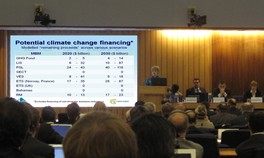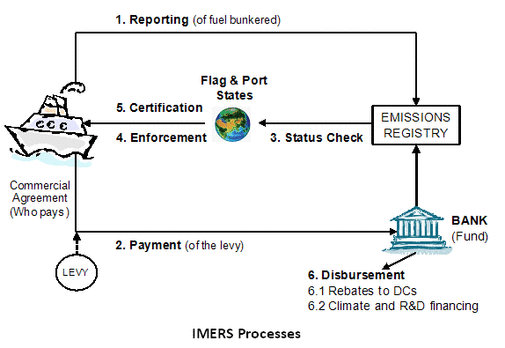Rebate Mechanism & MEPC 61
 Further progress on reducing greenhouse gas (GHG) emissions from ships was made at the IMO MEPC 61 session. MEPC received a comprehensive 300+ page report
Further progress on reducing greenhouse gas (GHG) emissions from ships was made at the IMO MEPC 61 session. MEPC received a comprehensive 300+ page report ![]() (2.5MB) and presentation
(2.5MB) and presentation ![]() (2MB) from the Expert Group on Market-based Measures (MBM-EG).
(2MB) from the Expert Group on Market-based Measures (MBM-EG).
The group studied the various MBM proposals, including the Rebate Mechanism (RM) ![]() . Further details on RM
. Further details on RM ![]() were submitted, based on our work.
were submitted, based on our work.
Two main RM options were described in more details:
- add-on option (which can apply to any revenue raising MBM)
- integrated option (aka IMERS proposal, 3rd generation)

For more details see the document, available in 3 languages:
- MEPC 61/5/33 in English
 , Further information on a rebate mechanism for a market-based measure for international shipping
, Further information on a rebate mechanism for a market-based measure for international shipping
- MEPC 61/5/33 in French
 , Renseignements complémentaires sur un mécanisme de remboursement dans le cadre d'une mesure fondée sur le marché destinée aux transports maritimes internationaux
, Renseignements complémentaires sur un mécanisme de remboursement dans le cadre d'une mesure fondée sur le marché destinée aux transports maritimes internationaux
- MEPC 61/5/33 in Spanish
 , Información adicional sobre un mecanismo de reembolso para una medida de mercado para el transporte marítimo internacional
, Información adicional sobre un mecanismo de reembolso para una medida de mercado para el transporte marítimo internacional
- Base proposal is also available in these languages.
Summary of the GHG-related discussions
The ongoing UNFCCC negotiations have not resolved any political issues on shipping GHG emissions for the IMO yet, nor has the MBM-EG. Therefore, the discussions on addressing GHG were contentious and time consuming at the 61st session of the IMO's Marine Environment Protection Committe (MEPC 61), which took place in London, UK, from 27 Sept - 1 Oct 2010.
The most contentious issue, as before at the previous sessions MEPC 58, MEPC 59, and MEPC 60, was whether or not to explicitly take the CBDR principle into account (CBDR refers to common but differentiated responsibilities and respective capabilities, enshrined in the UNFCCC).
There was no majority view on which MBMs should be developed further, and certain concerns were raised regarding impact on world trade, and similar. An intersessional meeting in March 2011 will consider the MBMs further.
To make progress on these issues, MEPC:
- established an intersessional meeting in March/April 2011, tasked with providing an opinion on the compelling need and purpose of MBMs and further evaluating them, including impact on international trade.
Non-MBM measures
The technical and operational GHG measures progressed as well. The contentious issues were whether such measures should be mandatory for all countries, whether text relating to capacity building and technology transfer should be a part of regulation, whether the proposed measures should be implemented through an amendment of MARPOL convention's Annex VI, and whether they were mature enough.
The proposed amendments to Annex VI of MARPOL are to be circulated to the Parties by the IMO Secretary General, for consideration of adoption at MEPC 62.
Setting a global emission reduction target for GHG emissions from international shipping was not debated, due to lack of time.
MEPC considered also speed reduction as a regulatory option. It agreed that speed would be addressed indirectly through the other measures, and therefore decided that no further investigation of speed reductions as a separate regulatory path was needed.
Official information on the progress achieved at MEPC 61 is available from the IMO.